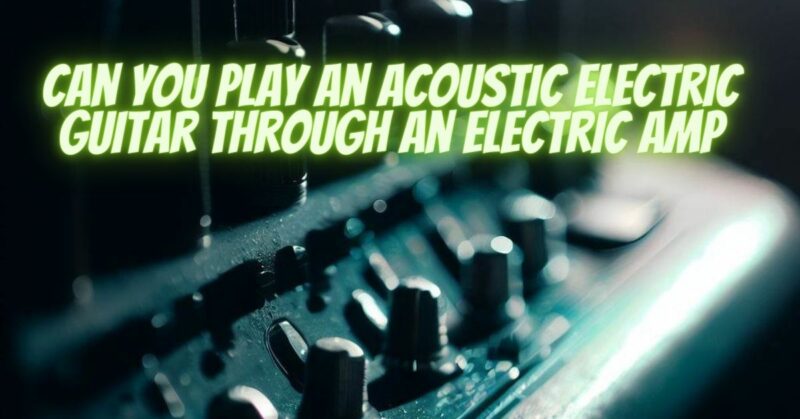The world of amplification offers a diverse range of options for musicians to explore, and the question of whether you can play an acoustic-electric guitar through an electric guitar amp often arises. While the two types of amps are designed for different instruments, there are scenarios in which using an electric guitar amp for an acoustic-electric guitar can work effectively. In this article, we’ll delve into the considerations and possibilities of using an electric guitar amp to amplify your acoustic-electric guitar.
Understanding the Differences
1. Acoustic-Electric Guitars:
Acoustic-electric guitars feature built-in pickups that capture the vibrations of the strings and body. This electrical signal can be sent to an amplifier for amplification. Acoustic-electric guitars are designed to reproduce the natural sound of the instrument, including its resonance and tonal characteristics.
2. Electric Guitar Amps:
Electric guitar amps are specifically designed to amplify the sound of electric guitars. They often feature tone-shaping controls, distortion effects, and speaker configurations that are tailored to enhance the characteristics of electric guitar pickups.
Using an Electric Guitar Amp for an Acoustic-Electric Guitar
While acoustic-electric guitars are best suited for acoustic amps, there are scenarios in which using an electric guitar amp can yield interesting results:
1. Creative Effects:
Electric guitar amps often come with built-in effects, such as distortion, reverb, and chorus. These effects can add unique textures to the acoustic-electric guitar’s sound, creating a distinctive sonic palette.
2. Distortion and Overdrive:
If you’re aiming for a more aggressive or experimental sound, using an electric guitar amp’s distortion or overdrive effects can transform the timbre of your acoustic-electric guitar.
3. Artistic Expression:
Using an electric guitar amp for an acoustic-electric guitar can lead to unexpected creative outcomes. The interplay between the guitar’s acoustic qualities and the amp’s electric-oriented characteristics can result in novel sounds.
Considerations and Limitations
1. Tonal Accuracy:
Electric guitar amps are optimized to complement the characteristics of electric guitar pickups, which can lead to tonal discrepancies when amplifying an acoustic-electric guitar. The natural resonance and nuances of the acoustic sound might not be fully captured.
2. Feedback:
Acoustic-electric guitars are prone to feedback, especially when using electric guitar amps that may not have feedback control features designed for acoustic instruments.
3. EQ Adjustments:
Adjusting the EQ settings on an electric guitar amp can help mitigate tonal disparities. Lowering the treble and increasing the midrange can help achieve a more balanced acoustic-like sound.
4. Speaker Configuration:
Electric guitar amps often have speakers designed to enhance the specific frequencies of electric guitars. This can impact how your acoustic-electric guitar sounds through the amp.
While using an electric guitar amp to amplify an acoustic-electric guitar can lead to interesting creative outcomes and unique sound textures, it’s important to be aware of the tonal differences and potential limitations. Electric guitar amps are optimized for electric guitars and might not fully capture the rich resonance and natural tonal characteristics of acoustic-electric guitars. If you’re seeking a more accurate and authentic representation of your acoustic-electric guitar’s sound, using a dedicated acoustic amp is generally recommended. However, if you’re open to experimentation and creative exploration, playing an acoustic-electric guitar through an electric guitar amp can open up a world of sonic possibilities.


